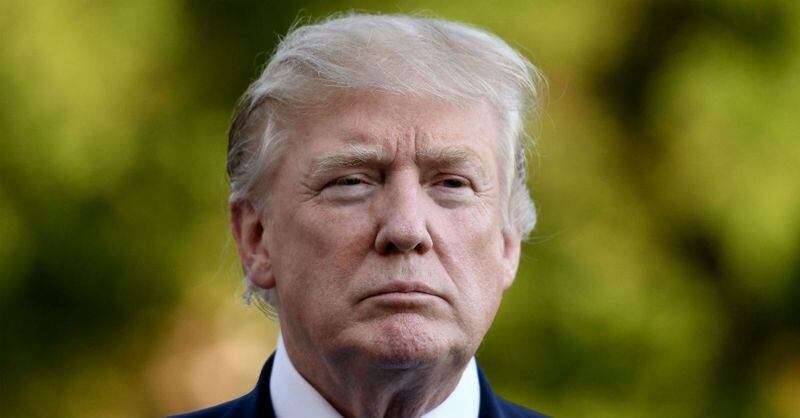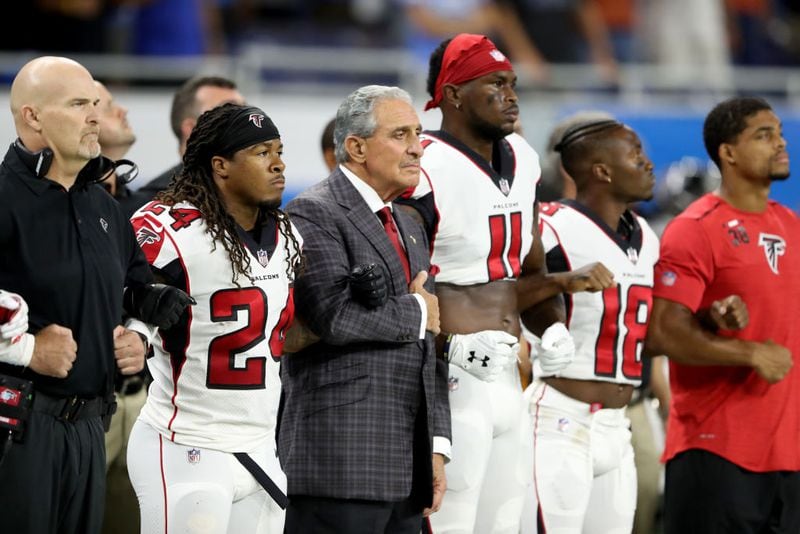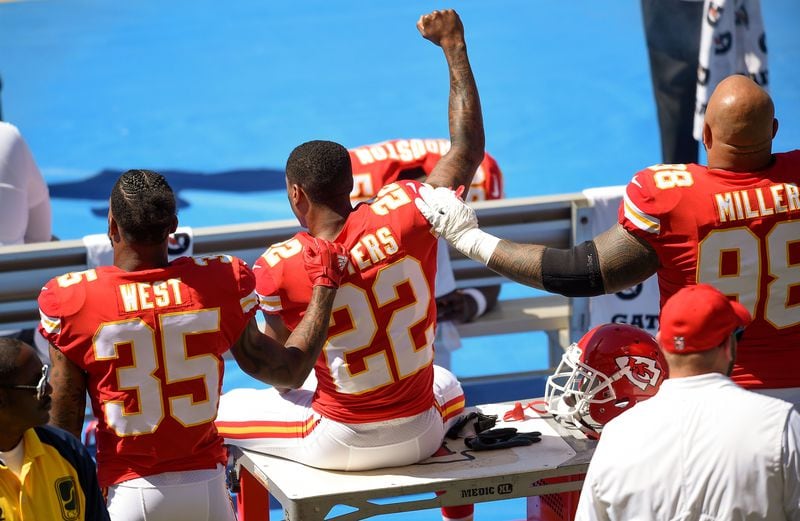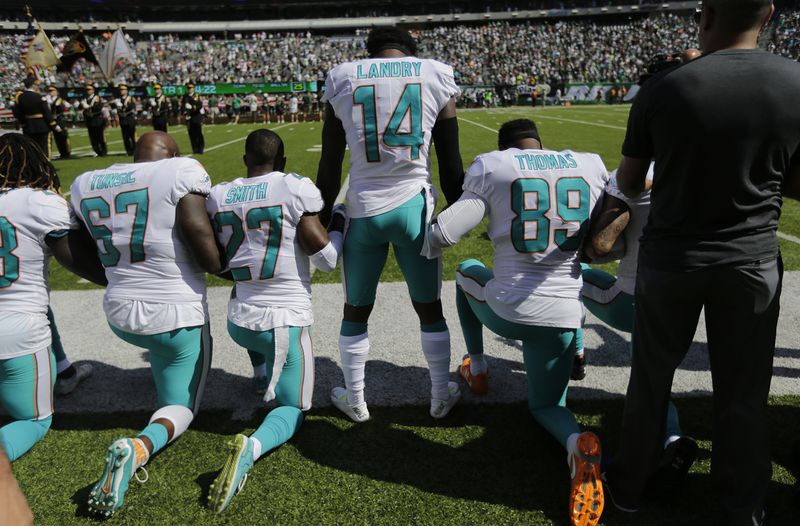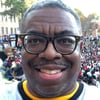The NFL continued its silent skirmish with President Donald Trump right into Monday Night Football, with both the Dallas Cowboys and the Arizona Cardinals locking arms in a show of solidarity during the national anthem. The entire Cowboys team, including owner Jerry Jones, took a knee in advance of the anthem, to boos from the stands, but then rose to lock arms as Jordin Sparks began singing.
Among his 21 tweets on the topic since Saturday, President Trump said early Tuesday: “The booing at the NFL football game last night, when the entire Dallas team dropped to its knees, was loudest I have ever heard. Great anger.”
Trump followed up a six minutes later:
Then Trump posted, about 8:30, another tweet saying: “The NFL has all sorts of rules and regulations. The only way out for them is to set a rule that you can’t kneel during our National Anthem!”
» Documenting the national anthem's problematic past
It was a continuation of the president's Twitter war on the National Football League, which has shifted attention from the point of the NFL protests — whether black Americans are subject to over-policing and excessive use of force — to whether athletes and team owners are disrespecting the nation, its flag and its armed forces.
The Cowboys’ owner said that was why his team knelt before the anthem but then stood.
“Our players wanted to make a statement about unity and we wanted to make a statement about equality,” Jones said after the game. “It was real easy for everybody in our organization to see that the message of unity, the message of equality was getting, if you will, pushed aside or diminished by the controversy. We even had the circumstances that it was being made into a controversy.”
“And that big American flag, it came down that field, and we all stood toes-out on the field and recognized and respected the American flag and the national anthem.”
The president found a deep well of support among Americans who were offended by Sunday's display, in which most of the National Football League stood (or knelt) together in a soundless rebuke to the president. That support may've been best summed up by NASCAR legend Richard Petty: "Anybody that don't stand up for the anthem oughta be out of the country. Period. What got 'em where they're at? The United States."
Trump tweeted on Monday that “the issue of kneeling has nothing to do with race. It is about respect for our Country, Flag and National Anthem. NFL must respect this!”
Many players and commentators said it was obvious that Trump’s weekend Twitter storm and his remarks in Alabama Friday — in which he used the words “son of a bitch” to describe NFL protesters — were all about race. Others decried the president’s decision to create greater division in the country at a time when Americans are facing more serious issues than what pro football players do at their games.
‘Then he moves on to something else’
UGA political scientist Audrey Haynes noted that Trump has established a kind of pattern with his Twitter campaigns.
“I think this one will do what all the other ones have done, end with President Trump sending out a tweet that seems to weave and bob a bit — perhaps akin to the one that said linking arms is OK but kneeling isn’t,” Haynes said of a tweet Trump posted Sunday afternoon. “And then moving on to something else. He generally seems to initiate, double down, then attempt a reset, and then perhaps another tweet about the subject and then he moves on to something else, perhaps relating to governance.”
(Indeed, just after the start of Monday night’s Cardinals-Cowboys game, Trump was tweeting not about the NFL but about poor conditions in Puerto Rico after Hurricane Maria.)
But Haynes said she sees a dark side to the president’s impulses.
“This is what could be dangerous: it is often difficult to really know what the president is suggesting. Did he really say that? Does he really mean that?” Haynes said. “Parts of the public that think he is being racially divisive for whatever reasons that may be, will take that message with them. Those who believe he is the uber patriot and this is about the national anthem, will take that with them. And the discussion to follow will be filled with unfiltered rhetoric on Twitter.”
A Morehouse College journalism professor thinks Trump erred in dredging the issue up. Colin Kaepernick, the former quarterback of the San Francisco 49ers, started the protests last year.
“It wasn’t a headline anymore,” said Ron Thomas, who heads the journalism and sports program at Morehouse. “But Donald Trump lit a fire under it. Trump picked on the wrong people to attack. Between the NBA and NFL is a group of powerful black people who make a lot of money and have credibility with a large, vast audience.”
Credit: Leon Halip
Credit: Leon Halip
Why you won’t see UGA protesting during anthem
You will not see football players at the University of Georgia or Georgia Tech (or most other Georgia schools) taking a knee during the “Star Spangled Banner” at their games. By standard practice, the teams don’t take the field until after the anthem has been played.
Likewise, Georgia State athletes are in their locker rooms during the anthem, a GSU spokeswoman said.
Saying the practice is not unique to Georgia, the spokeswoman said she has been around college sports since the 1980s and has never seen players on the field for the anthem. That’s because the college bands typically take the field to play the anthem, and the athletes run onto the field afterward.
Following on Trump's Alabama speech — in which the president said, "Wouldn't you love to see one of these NFL owners, when somebody disrespects our flag to say, 'Get that son of a bitch off the field right now, out. He's fired. He's fired!'" — Trump's weekend Twitter tirade invited a torrent of criticism in response.
For example, Lebron James, the NBA great who had called Trump a “bum” over the weekend, said Monday he was angry that the president has used sports to divide the country.
“The people run this country. Not one individual. And damn sure not him,” James said.
Others said the appeals to flag and anthem were distractions from the real issue.
“The protests are about a key element of American democracy,” said Carol Anderson, author of the National Book Award-winning “White Rage: The Unspoken Truth of Our Racial Divide.”
“What Kaepernick was protesting was rampant police brutality and a justice system that won’t act on it, despite body cameras, despite videos,” Anderson, a professor of African-American studies at Emory University, said. “This society has had major difficulties in dealing with African-Americans as citizens.”
Anderson said the result is a misdirection in which some white Americans focus on the reactions African-Americans have to disenfranchisement — not on the disenfrachisement itself.
“It’s a shell game to say, ‘He hates America,’ ‘He hates the military,’” Anderson said, referring to reactions to Kaepernick. “Black folks have always been the most patriotic because they are fighting for this nation and their citizenship in ways those who have always had rights do not.”
Activism grows among black athletes
Thomas, the sports writer and Morehouse journalism teacher, was chief researcher for the documentary, “Fields of Fire,” which traced landmark moments like Title IX, the emergence of Billie Jean King, the stance of Muhammad Ali and the controversial 1968 Olympics.
In an interview with The Atlanta Journal-Constitution after his class on Monday, Thomas said athletes, particularly black ones, were cautious about speaking out after the turbulent 1960s and 1970s.
“In the ’80s, ’90s and early 2000s, you seldom heard from the black athlete, because there was more at risk,” Thomas said. “They had these huge endorsement deals that they didn’t want to lose and some had their eyes on the broadcast booth.”
Thomas said the sea change came in March 2012, when LeBron James tweeted a picture of Miami Heat players wearing hoodies in support of Trayvon Martin. The hoodie became a universal symbol of resistance.
“After LeBron and the Heat, there was a gradual increase in the number of black athletes speaking out,” Thomas said. “Kaepernick brought it to the forefront.”
As did Trump last weekend.
The conservative National Review said the president had behaved in an “unseemly fashion.”
"(Trump) has exhibited his remarkable knack for making everything he touches about him, which the NFL protests weren't until he stuck his nose in," the Review said in an editorial Monday titled "Time Out."
“Conducting this business to the tune of ‘The Star-Spangled Banner’ has put President Trump in a comfortable position: him and the flag on one side, annoying protesters mucking up Sunday Night Football on the other.”
Contributing: Staff writers Helena Oliviero and Ty Tagami.
